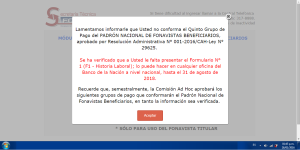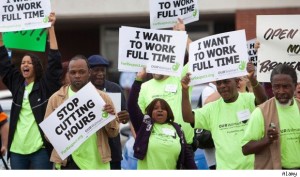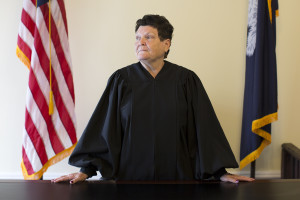Mes: enero 2016
PPK propuso crear una “élite administrativa” en el servicio civil para combatir la corrupción
Pedro Pablo Kuczynski dijo que no tener sueldos predecibles y reajustables para los funcionarios públicos promueve la corrupción.
Esta vez, a diferencia de la Cade 2015, la tos no opacó su discurso. El candidato por Peruanos por el Kambio, Pedro Pablo Kuczynski (PPK), empezó su intervención en el foro sobre corrupción organizado por Proética diciendo que toda la sociedad es responsable del problema de la corrupción y que la educación es clave para erradicarla.
En cuanto a las recetas institucionales propuso:
1. Crear una élite administrativa dentro del servicio civil.
Dijo que los mejores deben ingresar a la carrera pública a través de examen y que los sueldos deben ser predecibles y reajustables. “No habrá demagogia sobre que nadie puede ganar más que un ministro o el presidente. Eso nos lleva a la corrupción, el talento vale”, sugirió.
2. Podar los trámites interminables que no hacen más que promover la desconfianza y la corrupción.
3. Tener una ficha limpia.
“Si quieres presentarte al Congreso o a cualquier puesto público, tienes que tener tu ficha limpia. Y muerte civil si has sido condenado de algo inadmisible como violación, corrupción con dinero público y otras cosas de ese tipo”, explicó
4. Tener instituciones fuertes.
5. Fortalecer la Unidad de Inteligencia Financiera.
6. Fortalecer el Consejo Nacional de la Magistratura. Propuso debatir la reforma en dos sesiones parlamentarias consecutivas.
PPK señaló que para resolver los grandes problemas es necesario hablarlos y hacerlos parte de una temática nacional. Además, más allá de recurrir a instancias internacionales, dijo que lo principal es que el Perú primero reconozca sus problemas y hagan algo por solucionarlos.
En: semanaeconomica
¿Qué normas regulan la devolución de dinero a los trabajadores que contribuyeron al FONAVI?

Muchos Fonavistas se quejan porque pese a haber presentado toda la documentación necesaria (formularios llenos, historiales, documentos que avalan los pagos, etc) les sigue saliendo este aviso. De toda la normativa revisada, no hay un órgano ante el cual quejarse por este proceder de la Comisión Ad Hoc.
Descarga de Formularios de Inscripción y registro de Información de Periodos aportados al FONAVI: Aquí
2. Decreto Supremo Nº 006-2012-EF – Aprueban Reglamento de la Ley Nº 29625, Ley de devolución de dinero del FONAVI a los trabajadores que contribuyeron al mismo
3. Sentencia del Tribunal Constitucional N° 0012-2014-PI/TC : Caso FONAVI 2014 – Demanda de inconstitucionalidad contra la Septuagésima Segunda Disposición Complementaria Final de la Ley 30114, de Presupuesto del Sector Público
4. AUTO 3 ACLARACIÓN STC N° 0012-2014-PI/TC
5. AUTO 4 ACLARACIÓN STC N° 0012-2014-PI/TC
8. RESOLUCIÓN ADMINISTRATIVA Nº 001-2015/CAH-Ley Nº 29625 – Resolución Administrativa que aprueba el Padrón Nacional de Fonavistas Beneficiarios – Primer Grupo de Pago (Emitida por la COMISIÓN AD HOC CREADA POR LA LEY Nº 29625) – Publicada 11 Enero 2015
9. RESOLUCIÓN ADMINISTRATIVA Nº 01293-2015/CAH-LEY Nº 29625 – Resolución Administrativa que aprueba el Padrón Nacional de Fonavistas Beneficiarios – Segundo Grupo de Pago (Emitida por la COMISIÓN AD HOC CREADA POR LA LEY Nº 29625) – Publicada 3 Mayo 2015
10. RESOLUCIÓN ADMINISTRATIVA Nº 02059-2015/CAH-LEY Nº 29625 – Aprueban el Padrón Nacional de Fonavistas Beneficiarios – Tercer Grupo de Pago (Emitida por la COMISIÓN AD HOC CREADA POR LA LEY Nº 29625) – Publicada 19 Junio 2015
11. RESOLUCIÓN ADMINISTRATIVA Nº 02508-2015/CAH-Ley Nº 29625 – Resolución Administrativa que aprueba el Padrón Nacional de Fonavistas Beneficiarios – Cuarto Grupo de Pago (Emitida por la COMISIÓN AD HOC CREADA POR LA LEY Nº 29625) – Publicada 25 Octubre 2015
12. RESOLUCIÓN ADMINISTRATIVA Nº 001-2016/CAH-Ley Nº 29625 – Resolución Administrativa que aprueba el Padrón Nacional de Fonavistas Beneficiarios – Quinto Grupo de Pago (Emitida por la COMISIÓN AD HOC CREADA POR LA LEY Nº 29625) – Publicado 14 Enero 2016
13. RESOLUCIÓN ADMINISTRATIVA Nº 0313-2016/CAH-Ley Nº 29625 – Resolución Administrativa que aprueba el Padrón Nacional de Fonavistas Beneficiarios – Sexto Grupo de Pago – Publicado 24 Abril 2016
14. RESOLUCIÓN ADMINISTRATIVA Nº 1110-2016/CAH-Ley Nº 29625 – Resolución Administrativa que aprueba el Padrón Nacional de Fonavistas Beneficiarios – Séptimo grupo de Pago – Publicado 17 Julio 2016
15. RESOLUCIÓN ADMINISTRATIVA Nº 1111-2016/CAH-LEY Nº 29625 – Resolución Administrativa que aprueba el Padrón Nacional de Fonavistas Beneficiarios – Octavo Grupo de Pago – Publicado 23 Octubre 2016
16. RESOLUCIÓN ADMINISTRATIVA Nº 0001-2017/CAH-LEY Nº 29625 – Resolución Administrativa que aprueba el Padrón Nacional de Fonavistas Beneficiarios – Noveno Grupo de Pago – Publicado 22 Enero 2017
17. RESOLUCIÓN ADMINISTRATIVA Nº 0207-2017/CAH-LEY Nº 29625 – Resolución Administrativa que aprueba el Padrón Nacional de Fonavistas Beneficiarios – Décimo Grupo de Pago – Publicado 30 Abril 2017
18. RESOLUCIÓN ADMINISTRATIVA N° 02235-2017/CAH-LEY N° 29625 – Resolución Administrativa que aprueba el Padrón Nacional de Fonavistas Beneficiarios – Undécimo Grupo de Pago – Publicado 16 Julio 2013
Star Wars The Force Awakens: algo del mejor CGI del mundo
Watch Star Wars Artists Turn Lupita Nyong’o Into Maz Kanata in This Astonishing Video
Fan de Star Wars crea un lighsaber muy peculiar
USA: The Way Forward for Federal Background Investigations
The Government has a responsibility to determine the fitness of Federal employees, members of the Armed Forces, and contractors for the jobs they are hired into and can be trusted in the sensitive work they do on behalf of the American people each and every day. At the same time, we as leaders in Government must work diligently to protect the information these individuals give us in order to verify their readiness.
With these responsibilities in mind, today, the Federal Government announced a series of changes to modernize and strengthen the way we conduct background investigations for Federal employees and contractors and protect sensitive data. These changes include the establishment of the National Background Investigations Bureau (NBIB), which will absorb the U.S. Office of Personnel Management’s (OPM) existing Federal Investigative Services (FIS), and be headquartered in Washington, D.C. This new government-wide service provider for background investigations will be housed within the OPM. Its mission will be to provide effective, efficient, and secure background investigations for the Federal Government. Unlike the previous structure, the Department of Defense will assume the responsibility for the design, development, security, and operation of the background investigations IT systems for the NBIB.
Today’s announcement comes after an interagency 90-Day Suitability and Security review commenced last year in light of increasing cybersecurity threats, including the compromise of information housed at OPM, to re-examine reforms to the Federal background investigations process, assess additional enhancements to further secure information networks and systems, and determine improvements that could be made to the way the Government conducts background investigations for suitability, security and credentialing.
This review was conducted by the interagency Performance Accountability Council (PAC), which is chaired by the Office of Management and Budget (OMB) and comprised of the Director of National Intelligence (DNI), the Director of the U.S. Office of Personnel Management, in their respective roles as Security and Suitability Executive Agents of the PAC, and the Departments of Defense (DOD), the Treasury, Homeland Security, State, Justice, Energy, the Federal Bureau of Investigation, and others. It also included consultation with outside experts.
We are proud of the collaborative effort of the interagency team that helped identify these critical reforms. And we are committed to protecting the security of not only our systems and data, but also the Personally Identifiable Information of the people we entrust with protecting our national security.
We also want to thank the men and women of OPM’s Federal Investigative Services for the work they do every day to provide quality background investigations to agencies across Government.
The Administration will establish a transition team that will develop a plan to stand up NBIB and migrate the existing functions of the current Federal Investigative Service to the NBIB, and to make sure that agencies continue to get the investigative services they need during the transition.
For more information about today’s announcement please go tohttps://www.whitehouse.gov/blog/2016/01/22/way-forward-federal-background-investigations.
In: opm.gov
Wal-Mart strikes lawful, must reinstate workers: NLRB judge
Wal-Mart Stores Inc (WMT.N) unlawfully retaliated against workers who participated in strikes in 2013 and must offer to reinstate 16 dismissed employees, a National Labor Relations Board judge ruled on Thursday.
Administrative Law Judge Geoffrey Carter said in a ruling posted on the board’s website that the U.S. retailer violated labor law by “disciplining or discharging several associates because they were absent from work while on strike”.
The ruling was hailed by one labor group as a “huge victory” for employees, although Wal-Mart indicated it would likely appeal the decision to the labor agency’s board in Washington, and pointed to its recent efforts to improve worker benefits and raise pay.
“We disagree with the Administrative Law Judge’s recommended findings and we will pursue all of our options to defend the company because we believe our actions were legal and justified,” Wal-Mart spokesman Kory Lundberg said.
Carter was ruling on a complaint filed by the NLRB on behalf of a union-backed worker group, OUR Walmart, in 2014. Most of the allegations related to a coordinated set of strikes collectively referred to the “Ride for Respect” because they involved traveling by bus to the company’s headquarters in Arkansas for protests at its shareholders’ meeting in June 2013.
Wal-Mart had argued that it was lawful to discipline workers with unexcused absences to participate in the protests because the strikes constituted “intermittent work stoppages” not protected under labor law.
But the judge found the “Ride for Respect” differed materially from other previous work stoppages not protected by law because, among other factors, it was not a brief strike — meaning the risk for workers was higher — and because it was not scheduled close in time with other strikes.
Carter ordered Wal-Mart to offer 16 former workers their previous jobs and make them “whole for any loss of earnings and other benefits suffered as a result of the discrimination against them”.
Wal-Mart was also ordered to hold a meeting in more than two dozen stores to inform workers of their rights to organize under U.S. labor law.
Jessica Levin, spokeswoman for labor group Making Change at Walmart, which is backed by the United Food & Commercial Workers International Union (UFCW), described the ruling as a “huge victory” for the dismissed workers as well as “Walmart workers everywhere”.
It was unclear what impact, if any, the decision would have on the efforts by Making Change at Walmart and other groups to pressure Wal-Mart on wages and benefits. The UFCW has tried for years to organize Wal-Mart workers and the hurdles remain high.
The ruling comes a day after Wal-Mart announced that it was raising wages for 1.2 million U.S. workers in 2016 as part of a $2.7 billion investment over two years in wages and training.
While denting profits near term, Wal-Mart has said the investments are helping improve customer service and worker engagement scores.
(Reporting by Nathan Layne in Chicago; Editing by Sandra Maler)
En: reuters
Un día con el presidente Nicolás Maduro
Dicen que para tener una opinión completa sobre cualquier tema que se desee criticar, es necesario analizar su situación. Este reportaje ha sido elaborado por la investigadora Eva Golinger para RT, una agencia de noticias rusa, la cual, como todo medio de información al servicio de un gobierno determinado, presenta al presidente venezolano Nicolás Maduro desde su punto de vista (antinorteamericano).
Tomando en cuenta la actual situación de Rusia en medio oriente y su apoyo a los rebeldes sirios, las sanciones por parte de la Unión Europea a Rusia por la anexión de Crimea y la agresiva política internacional de Vladimir Putin respecto al bloque occidental; no sorprende que este reportaje tenga un tinte propagandístico.
Los detalles del video, como el retrato del peronista Néstor Kirchner en la sala del consejo de ministros, la firma de un convenio colectivo con los trabajadores petroleros en plena calle, los gustos musicales y la visión de la política exterior norteamericana (variante Bush y variante Obama) del presidente venezolano así como la pleitesía de un sector de la población para con él, y el temor de un probable golpe de estado gestado por la oposición que ahora es mayoría en el Congreso venezolano, hacen de este reportaje un material con muchas cosas para analizar.
The People Who Run Gifford, S.C.’s Tiny Government
The small, rural town of Gifford, S.C., survives with help from just 12 enthusiastic public employees — most of whom aren’t even paid.
In tiny towns like Gifford, S.C., the municipal government consists of very few people. A dozen employees, most of whom are unpaid and work part-time, see to the needs of the town’s 289 citizens. Here, the entire city council — Alvin Murdaugh, Lindsay Strong, Leon Blake and Horney Mitchell — stands in front of the town hall, a former family home that was donated to the city.

In tiny towns like Gifford, S.C., population 289, the city government can be downright minuscule. Gifford’s municipal government comprises a total of 12 employees, most of whom are unpaid and/or work part-time. Here, the entire city council — Alvin Murdaugh, Lindsay Strong, Leon Blake and Horney Mitchell — stands in front of the town hall, a former family home that was donated to the city. (Photos by David Kidd)
Laquan Keith Mitchell, elected in 2013, is the fourth mayor of Gifford. His father is a councilman.
Municipal Judge Sheryl McKinney holds court once a month and typically hears a dozen cases, mostly traffic-related.
Clerk of the Court Patricia McTeer is often the only employee on duty at Gifford Town Hall.
Police Chief James Mitchell (no relation to the mayor) brings in a sizable portion of Gifford’s revenue by writing tickets.
George Woods is always on call to take care of general maintenance.
Town Clerk Carleen Wright is also the treasurer.
En.- governing








